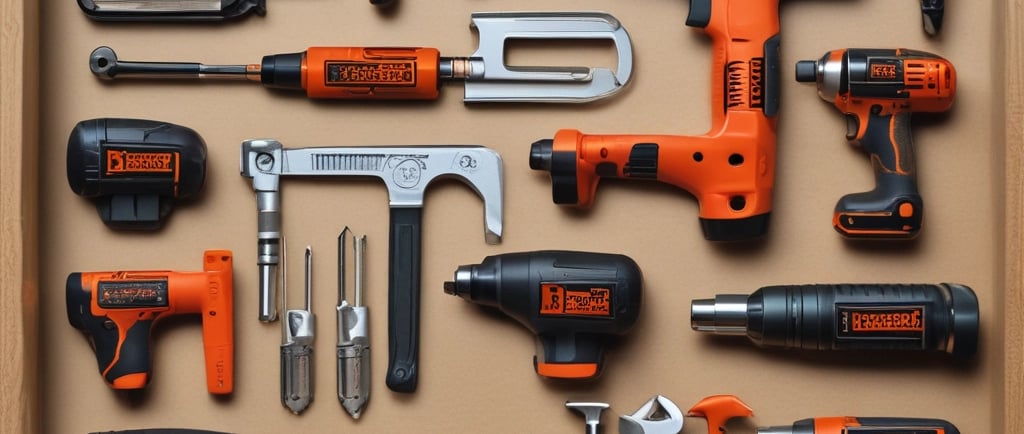The Evolution of Black+Decker Tools: A Journey Through Innovation
BLACK+DECKER GENERAL
10/13/20254 min read


A Brief History of Black+Decker
Founded in 1910 by S. Duncan Black and Alonzo G. Decker, Black+Decker began its journey in a modest garage in Baltimore, Maryland. The company initially focused on manufacturing machine tools, a sector that was vital to the burgeoning American industrial landscape. In the early years, Black+Decker quickly established a reputation for quality and innovation, which served as a cornerstone for its future advancements.
One of the pivotal moments in the history of Black+Decker came in 1916 with the introduction of the first portable electric drill. This groundbreaking tool revolutionized the hardware industry, allowing both professionals and DIY enthusiasts to tackle tasks with unprecedented efficiency. The drill's design allowed for greater portability and ease of use, setting the stage for a new era in power tools. This innovation not only showcased the company's commitment to advancing technology but also reflected a significant shift in how tools would be used in the future.
Throughout the 1920s and 1930s, Black+Decker continued to diversify its product line, introducing various tools and appliances that catered to both industrial and consumer markets. Their focus on research and development allowed them to stay ahead of the competition, ensuring that they were not only participants in the market but leaders. Key innovations during this time included the introduction of the world's first electric screwdriver, which further underscored Black+Decker's role as a pioneer in electrical tool technology.
As the company evolved, its influence expanded beyond manufacturing, with a burgeoning global presence and a commitment to shaping the future of power tools. By continually focusing on innovation, Black+Decker laid the groundwork for its status as a household name in the hardware industry, a title it holds to this day.
Innovative Product Development Over the Decades
Black+Decker has consistently demonstrated its commitment to innovation through the introduction of ground-breaking products that cater to the evolving needs of consumers. The company's journey began in the 1960s with the launch of the first cordless drill, a revolutionary product that transformed the landscape of power tools. This innovation not only provided users with increased portability but also enhanced convenience, allowing tasks to be completed more efficiently.
As consumer preferences shifted towards more user-friendly and ergonomic tools, Black+Decker responded adeptly by integrating advanced ergonomics into their designs. The focus on user comfort helped mitigate the physical strain often associated with prolonged tool use, making their products appealing to both professionals and DIY enthusiasts. The emphasis on ergonomics reflected a broader understanding of user experience, which laid the groundwork for future innovations.
The advancements in battery technology have particularly marked the evolution of Black+Decker tools over the years. By continually refining battery performance, the company has enabled users to enjoy extended runtime without sacrificing power. The development of lithium-ion batteries provided a significant leap forward, offering lightweight options that maintained high energy output. This innovation has significantly enhanced the functionality and user satisfaction of their power tools, securing Black+Decker's position as a leader in the sector.
Moreover, the company has not shied away from embracing smart technologies. With the advent of smart home devices, Black+Decker integrated Bluetooth connectivity into some of its tools, allowing for seamless interaction between devices. This move not only reflects the changing landscape of consumer technology but also signals Black+Decker's intent to stay ahead of trends and meet modern demands.
Sustainability and Modern Advancements
In recent years, Black+Decker has made significant strides in embracing sustainability and eco-friendly practices within its product development framework. As consumers increasingly prioritize environmental impact, the company has proactively integrated energy-efficient technologies into its tool offerings. These advancements not only contribute to reduced energy consumption during use but also align with broader societal goals aimed at minimizing the carbon footprint associated with construction and DIY projects.
One notable initiative has been the incorporation of recycled materials in the manufacturing process of various tools. By utilizing recycled plastics and other sustainable raw materials, Black+Decker is actively reducing the environmental burden often associated with traditional manufacturing practices. This commitment reflects a growing trend in the industry, where companies are responsible not only for the functionality of their products but also for their environmental footprint throughout the lifecycle.
Additionally, Black+Decker has engaged in partnerships with various environmental organizations to bolster its sustainability efforts. These partnerships aim to advance research and promote awareness regarding eco-friendly practices within the tools market. Such collaborations highlight the company's commitment to not only improving its products but also contributing to environmental stewardship at a community level.
Moreover, modern advancements in technology have led to the development of smart tools by Black+Decker. These innovative products often feature Bluetooth connectivity and specialized applications that enhance user experience by optimizing tool performance and offering insights into efficient usage. The integration of smart technology serves as an essential bridge between traditional tool usage and today's technological landscape, showcasing Black+Decker's adaptability to evolving consumer preferences and their commitment to environmental consciousness.
The Future of Black+Decker Tools
As we move further into the 21st century, the future of Black+Decker tools is undoubtedly shaped by significant advancements in technology and shifting consumer demands. One of the most notable trends in the power tool industry is the increased integration of automation and connectivity. Consumers increasingly favor tools that not only enhance efficiency but also incorporate smart features, such as Wi-Fi and Bluetooth connectivity. These features allow for remote operation, diagnostics, and tailored user experiences, indicating that Black+Decker is likely to further invest in tech-enriched products that cater to the evolving needs of both professionals and DIY enthusiasts.
In addition to automation, sustainability is expected to play a crucial role in the future direction of Black+Decker tools. With a growing emphasis on environmentally friendly practices, the brand may focus on the development of battery-operated and solar-powered devices. This approach not only addresses consumer concerns regarding environmental impacts but also aligns with global efforts to reduce carbon footprints. By incorporating sustainable materials and energy-efficient designs, Black+Decker can solidify its position as a leader in innovative tools while appealing to a broader audience.
Furthermore, consumer feedback and community engagement will be pivotal in informing Black+Decker's product development strategies. By actively listening to their customer base, the brand can identify pain points and tailor solutions accordingly. Engaging with communities through workshops and collaboration will create a feedback loop that inspires continuous improvement and innovation. Alongside these strategies, global market opportunities present a vast landscape for growth, allowing Black+Decker to expand its reach and adapt products to meet diverse regional needs.
Overall, the future of Black+Decker tools is characterized by a commitment to innovation, sustainability, and consumer-centered strategies, setting the stage for a lasting legacy in the power tool industry.
